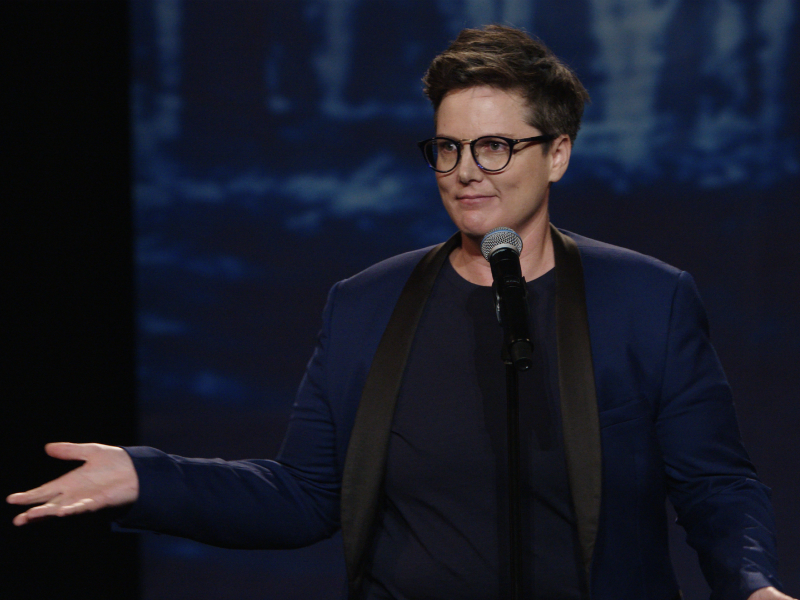A friend recently reminded me I used to joke about opening a chain of tragedy clubs when everyone had grown bored of all the laughter. Watching some recent comedy projects, it seems my prediction may have come true.
Comics have always wanted to show their serious side. Think of Charlie Chaplin with his mixture of slapstick and sentiment, or Jackie Gleason’s award winning turn in The Hustler, Albert Brooks’ terrifying mobster in Drive, or Sarah Silverman’s smile- free portrait of addiction in I Smile Back. And the list goes on.
But lately, there’s been a trend for comics to get mopey and miserable in their stand-up sets, most notably in the groundbreaking, controversial and frustrating Nanette written and performed by Hannah Gadsby in her recent Netflix special.
If you wonder what we comedians have been talking about, it’s this 68-minute special, filmed at the prestigious Sydney Opera House. There’s rarely been anything so divisive amongst comics. Generally, women love it and men don’t. But that’s just a bit too simple.
Gadsby is a 40-ish comedian from Tasmania, gay, and somewhere on the autism spectrum. Clearly she’s earned her outsider status. She’s been working as a comic for years, and this is not her first comedy special. Nanette starts out conventionally, with Gadsby telling stories of coming out to her family and friends, and gets her fair share of yuks with tales of being the proverbial fish out of water. So far, so good.
But then, about 20 minutes in, she changes gears radically, and tells of the brutal sexual assaults against her, of the ugly homophobia she’s endured, and none of it leavened with the expected punchlines. There are none; no relief, no resolution; she just stares her audience down as they shift uncomfortably in their seats, waiting for the funny that never comes.
Then Gadsby doubles down and dismisses comedy as merely a patriarchal product; that instead of liberating our souls it enslaves them by trivializing our traumas. “Stand-up comedy is an invention by men for men,” she says, which might be a surprise for the 60 per cent of the comedy audience in my clubs who happen to be women. She excoriates Picasso (Gadsby’s training is in art history) for his relationship with a 17-year-old girl, insisting it nullifies his credibility as an artist. And then, the special is over, as she gets a standing ovation from her adoring crowd.
There’s no doubt her autobiographical show is an act of courage; I respected it even though I like some patriarchs (Abraham, Moses, anyone?) and could not imagine a world without Picasso’s magnificent canvasses, no matter what his offstage life was like. But in the end, I felt sorry for her. Comedy has always been a form of therapy for the afflicted, and here was Gadsby telling everyone the therapy just wasn’t working for her anymore.
READ: NEW SHOWS TAKE A BIG LEAP IN DEPICTING STANDUP COMEDY
Then there’s the self-titled Drew Michael special on HBO. Michael is some kind of performance artist/comedian who chose to film an entire hour of self- lacerating comedy directly to camera – no audience, no laugh track, nothing that would indicate that it was supposed to be funny. Michael is a deaf Jewish New Yorker whose lifestyle is poles removed from Gadsby but whose sensibility is quite similar. There is very little humour here although there are a few witty bitter observations. But the weird part is when he goes all postmodern and talks about “the last joke” and then we wonder, “what joke?” This is one unwatchable hour of television and I will buy you dinner if you can get through it.
The game changer here was Tig Notaro, a Mississippi-born comedian who, a decade ago, found out she had breast cancer the afternoon of a club date she had that evening in Los Angeles. Instead of cancelling her show that night, she went on and told the audience about her cancer and confronted it with dark humour. Someone taped the show, it went viral on the Internet, and it became an acclaimed HBO special, in which she took off her shirt to show her mastectomy scars while she riffed on various personal issues. This is about as far from jokes about airline food as you can get.
I must, however, place some blame upon the cable companies and streaming services for the bait and switch, marketing these shows as comedies to get a bigger audience when they’re really something else. As Gadsby the art critic herself would know, the frame influences the perception of the art. If I saw these shows without the expectation of laffs, I might have a more open mind.
I’m always glad when the envelope is pushed in my profession. I’ve never been averse to personal subjects or controversial themes. But I’m still a bit old-fashioned; I like it best when comedy makes me laugh.
